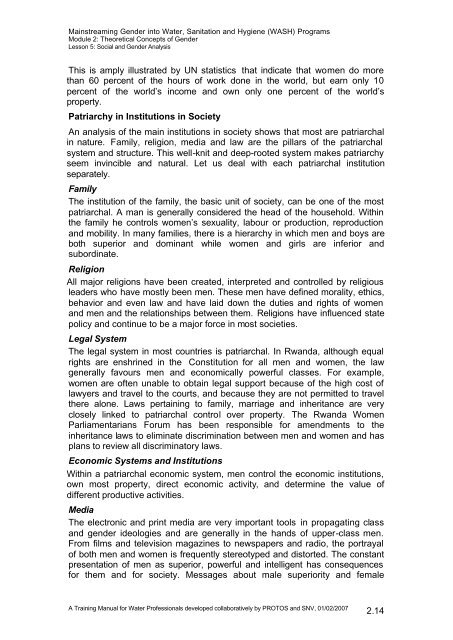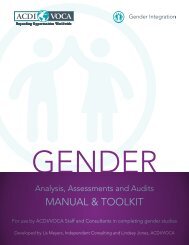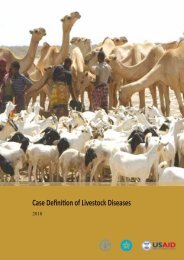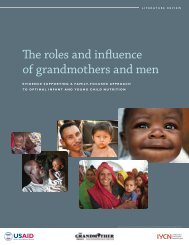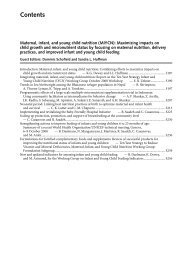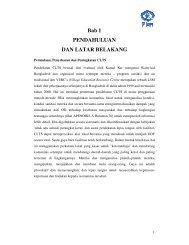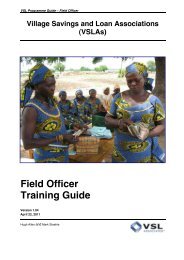Module 2. Theorethical Concepts of Gender - FSN Network Portal
Module 2. Theorethical Concepts of Gender - FSN Network Portal
Module 2. Theorethical Concepts of Gender - FSN Network Portal
Create successful ePaper yourself
Turn your PDF publications into a flip-book with our unique Google optimized e-Paper software.
Mainstreaming <strong>Gender</strong> into Water, Sanitation and Hygiene (WASH) Programs<br />
<strong>Module</strong> 2: Theoretical <strong>Concepts</strong> <strong>of</strong> <strong>Gender</strong><br />
Lesson 5: Social and <strong>Gender</strong> Analysis<br />
This is amply illustrated by UN statistics that indicate that women do more<br />
than 60 percent <strong>of</strong> the hours <strong>of</strong> work done in the world, but earn only 10<br />
percent <strong>of</strong> the world’s income and own only one percent <strong>of</strong> the world’s<br />
property.<br />
Patriarchy in Institutions in Society<br />
An analysis <strong>of</strong> the main institutions in society shows that most are patriarchal<br />
in nature. Family, religion, media and law are the pillars <strong>of</strong> the patriarchal<br />
system and structure. This well-knit and deep-rooted system makes patriarchy<br />
seem invincible and natural. Let us deal with each patriarchal institution<br />
separately.<br />
Family<br />
The institution <strong>of</strong> the family, the basic unit <strong>of</strong> society, can be one <strong>of</strong> the most<br />
patriarchal. A man is generally considered the head <strong>of</strong> the household. Within<br />
the family he controls women’s sexuality, labour or production, reproduction<br />
and mobility. In many families, there is a hierarchy in which men and boys are<br />
both superior and dominant while women and girls are inferior and<br />
subordinate.<br />
Religion<br />
All major religions have been created, interpreted and controlled by religious<br />
leaders who have mostly been men. These men have defined morality, ethics,<br />
behavior and even law and have laid down the duties and rights <strong>of</strong> women<br />
and men and the relationships between them. Religions have influenced state<br />
policy and continue to be a major force in most societies.<br />
Legal System<br />
The legal system in most countries is patriarchal. In Rwanda, although equal<br />
rights are enshrined in the Constitution for all men and women, the law<br />
generally favours men and economically powerful classes. For example,<br />
women are <strong>of</strong>ten unable to obtain legal support because <strong>of</strong> the high cost <strong>of</strong><br />
lawyers and travel to the courts, and because they are not permitted to travel<br />
there alone. Laws pertaining to family, marriage and inheritance are very<br />
closely linked to patriarchal control over property. The Rwanda Women<br />
Parliamentarians Forum has been responsible for amendments to the<br />
inheritance laws to eliminate discrimination between men and women and has<br />
plans to review all discriminatory laws.<br />
Economic Systems and Institutions<br />
Within a patriarchal economic system, men control the economic institutions,<br />
own most property, direct economic activity, and determine the value <strong>of</strong><br />
different productive activities.<br />
Media<br />
The electronic and print media are very important tools in propagating class<br />
and gender ideologies and are generally in the hands <strong>of</strong> upper-class men.<br />
From films and television magazines to newspapers and radio, the portrayal<br />
<strong>of</strong> both men and women is frequently stereotyped and distorted. The constant<br />
presentation <strong>of</strong> men as superior, powerful and intelligent has consequences<br />
for them and for society. Messages about male superiority and female<br />
A Training Manual for Water Pr<strong>of</strong>essionals developed collaboratively by PROTOS and SNV, 01/02/2007<br />
<strong>2.</strong>14


